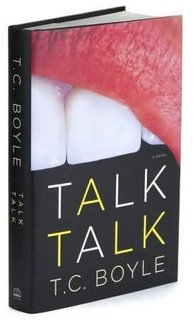
Be it the sublime adventure of Water Music or the historical misadventure of The Inner Circle, there is something improbably charismatic about T. C. Boyle’s writing. This x-factor makes him easy to get into, even when he shows off his eclectic vocabulary (“a hard irreducible bolus of hatred”); Boyle’s books have bounce. They roll, they lilt: there’s a bit of the whimsical Irish writers in them. In Talk Talk, words have to do even more—one of the three main characters, Dana Halter, is deaf, and though Boyle never deviates from his neo-classical narrative, he works the silence into images that remind the reader just how good he is.
“The yellow there darkened to gold, to honey, to a deep hungering sepia as the killer in his mask flailed the too-white blade at his victim, the heroine in her midnight-blue teddy, who could only run and crouch and hide, bare-legged, her painted toenails gathering in every particle of light as if to shut the camera down. Dog barking, the caption read.
Glass breaking.
A quick close-up of the victim, her makeup smeared, eyes dilated with terror.
Sobbing continues.”
This is a thriller though, so Boyle doesn’t wax too philosophic. When the police refuse to help (identity theft being a “victimless crime”), Bridger and Dana go cross-country to track down the villain. They’re a little too good at it, but the car chases, the narrow escapes, and the double-sided narrative justifies all the coincidence. This refusal to linger with digressions does wonders for the pacing (e.g., though Boyle has fleshed out Dana’s story, Wild Child, into a novel, he wisely chose to publish it separately).
As a result, Talk Talk is Boyle’s most accessible novel. Set in the suspenseful present and written in the beach-reader’s cadence, the novel has something for everyone: a high-speed car chase, prison melodrama, and the woes of the working class. Shifting through these hot themes, it’s hard to imagine a reader not relating to some aspect of this novel and harder still to imagine someone unbothered by the apparent ease of identity theft. And through all this, Boyle’s writing is still rich, still taut, and still exciting. Even plunging into the steady riggings of the thriller genre, the pages abound with unusual nuances and flourishes.
“She was at a disadvantage, because it took both hands to compress a twelve-inch submarine sandwich and keep it from disintegrating into its constituent parts, but she was game.”
However (though this is typical of Boyle), Talk Talk lacks a fitting resolution to its dramatic climax. This is the author’s style: to leave the audience hanging on the realization that life only ties itself up neatly in death, (and even then, there is always something left behind). This particular ending seems more appropriate for one of Boyle’s shorts: it doesn’t capture the gist of the novel; it says very little of the relationships between the characters, and less still for the changes in their lives. That is the sole disappointment of Talk Talk: that there is, in the end, nothing more to it than talk.

No comments:
Post a Comment